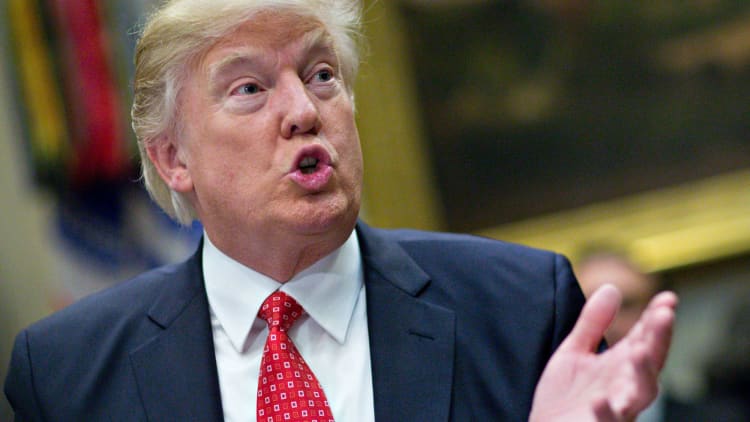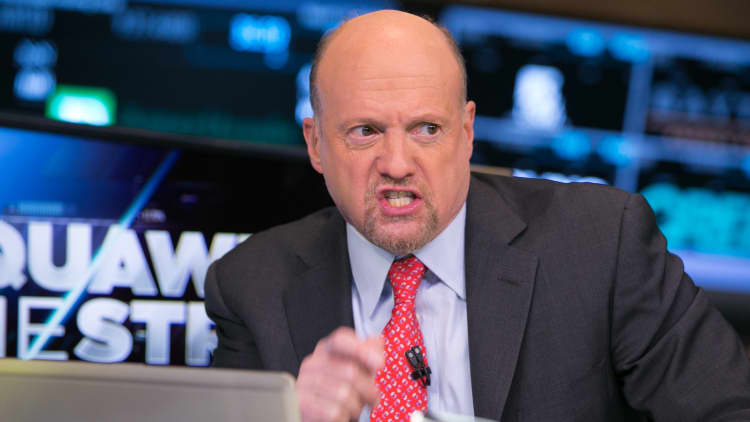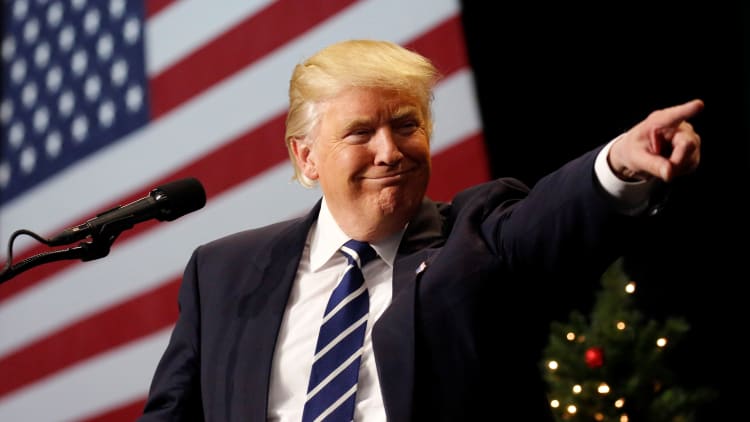
Americans will likely have to file their taxes before they see President Donald Trump 's tax plan passed.
Trump on Thursday told airline executives he will announce something "over the next two or three weeks that will be phenomenal in terms of tax." The statement helped to boost stocks because the prospect of lower taxes has fueled hopes for rising corporate profits. Optimism about tax reform had waned in the early days of his presidency as Trump focused on other actions like immigration.
Still, those hoping for tax reform will likely have to wait months, at least, for it to get done. Due to the congressional budget process and political realities, Trump may not sign tax policy into law until late this year or even next year, experts said.
"The chances for tax reform happening are the highest they've ever been, but they still have their work cut out for them," said Marc Goldwein, senior vice president and senior policy director at the Committee for a Responsible Federal Budget, a nonpartisan organization that studies fiscal policy.
Where tax reform stands
Trump made across-the-board tax cuts on individuals and businesses a key plank of his campaign, and that — along with pledges to roll back regulations — gave Wall Street hopes for climbing corporate profits. When Trump won the White House and Republicans kept the House and Senate, a tax-reform plan became more likely than it has been in decades.
Trump said he planned to cut income tax rates and slash corporate taxes from 35 percent to 15 percent. A Tax Policy Center estimate said his proposal would add $7.2 trillion to the national debt over a decade. House Republicans also have a tax plan that partly overlaps with Trump's but contains some key differences, including a 20 percent corporate tax rate and a border adjustment provision.
Asked on Sunday if Americans should expect a tax cut this year, Trump said he was optimistic.
"I think so, yes," Trump told Fox News. "And I think before the end of the year I would like to say yes."
The process of accomplishing that is complicated. A straight tax cut could happen by January, but true tax reform could take well into 2018, said Howard Gleckman, a senior fellow at the Tax Policy Center, a Washington think tank that is a joint venture of the Brookings Institution and the Urban Institute.

A tax cut drops the rate paid and reduces the amount of money going to government. Tax reform can come in several forms, but essentially it means shifting the burden from one set of groups to another. A "revenue neutral" plan means that tax cuts are offset by closed loopholes.
A tax cut, rather than tax reform, would largely require less wrangling by lawmakers and stakeholders like corporations, and could get passed more quickly, Gleckman said.
How it could happen
Republicans have indicated that they want to focus on repealing most of the Affordable Care Act before they turn to tax policy. Many GOP members of Congress favor having a replacement for the ACA in hand before repeal.
"It's just the way the budget works that we won't be able to get the ability to write our tax reform bill until our spring budget passes, and then we write that through the summer," House Speaker Paul Ryan recently told Fox News' "Fox and Friends."
That means tax reform plans may not even start to get serious attention in the GOP-controlled Congress until the summer or fall. Republicans, who have 52 seats in the Senate, have signaled they want to use a process called reconciliation to pass legislation to repeal and replace the ACA and implement tax reform.
Democrats in a Senate that has become entrenched in bitter partisanship in the early days of Trump's presidency likely will not support the health care and tax changes. Therefore, the GOP will try to use a process that requires 51 votes rather than 60.
White House Press Secretary Sean Spicer said Congress will use fiscal year 2017 reconciliation for the ACA, popularly known as Obamacare. The fiscal 2018 reconciliation, which could come later this year, will focus on "a comprehensive tax plan" for both the "business side and individual tax rates," Spicer said.
A provision in budget reconciliation would not allow an ACA repeal and tax reform in one fiscal year. Even though repealing Obamacare is the priority, Republicans have yet to craft a replacement plan.
"My guess is that next year is the earliest we'll see a big tax bill, and a lot of that depends on how much progress they make replacing Obamacare, which was a higher profile campaign promise than tax reform," said Robert Bixby, executive director of The Concord Coalition, a nonpartisan organization that promotes fiscal responsibility.
Republicans also will have to hash out disagreements among themselves about how best to structure tax policy. The most prominent discussion so far has centered around so-called border adjustment.
The proposal in the House GOP plan would put a 20 percent tax on imported goods. The border tax would coincide with slashing the corporate tax rate to 20 percent.
Sen. David Perdue, R-Ga., urged colleagues Wednesday to reject the provision, saying it is "regressive, hammers consumers, and shuts down economic growth." Other GOP senators — including Mike Lee of Utah and John Cornyn of Texas — also have expressed skepticism about the plan.
The White House has appeared to warm to the idea somewhat, floating a 20 percent tax on Mexican imports as a possible method to pay for a wall along the U.S.-Mexico border that could cost an estimated $21.6 billion.
Goldwein said that issue is "likely just the first of many discussions" that will take place during what will be a "hard process."
Democrats also have raised concerns about how tax changes could affect different income groups. Analyses of Trump's campaign plans said they would help wealthy taxpayers more than the middle class, though Trump's Treasury Secretary nominee Steven Mnuchin has said that will not happen.
WATCH: These are America's five richest presidents



